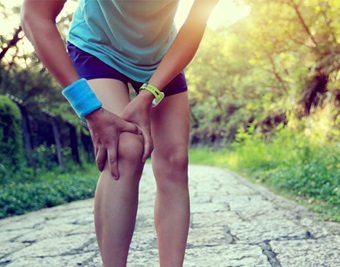Are Your Knees a Sore Sport? Get Solutions for Common Conditions
 Are your knees making popping or clicking sounds? Do they lock or give way? Are you experiencing knee pain or stiffness or swelling? If any of these describe your knees, you’re not alone. The knee is the largest and most complex joint, so it’s not surprising that knee pain affects about 25% of adults and is a common reason for doctor visits. And about one third of all sports injuries admitted to outpatient clinics are knee injuries. The most common knee injuries/conditions include:
Are your knees making popping or clicking sounds? Do they lock or give way? Are you experiencing knee pain or stiffness or swelling? If any of these describe your knees, you’re not alone. The knee is the largest and most complex joint, so it’s not surprising that knee pain affects about 25% of adults and is a common reason for doctor visits. And about one third of all sports injuries admitted to outpatient clinics are knee injuries. The most common knee injuries/conditions include:
- Fractures
- Anterior cruciate ligament injuries
- Meniscal tears
- Tendonitis
- Bursitis
- Tendon tears
- Posterior cruciate ligament injuries
- Osteoarthritis
If a sports injury or overuse condition has brought you to your knees, join Desert Care Network for a free informational seminar on common knee injuries and treatment options on August 28 at the La Quinta Medical Center. Dr. R. Tyler Huish will discuss a variety of conditions and treatment options from articular cartilage damage, fractures, patellar cartilage softening, degenerative changes, ligament injuries and more.
Sometimes treatment can be as simple as prescribed exercises to strengthen the knee. One example orthopedic surgeon Huish shared is, “If a patient experiences knee pain going up and down stairs and X-rays are negative and MRI doesn’t show much, it is often due to how the knee cap tracks. Pain in the front of the knee is typically treated conservatively with exercises to strengthen the quads and the hips to help keep the knee cap in the proper position.”
Did you know that when you do a deep squat, your knees experience seven times your body weight? One lifestyle change that can help your knee mobility and health is to lose weight. For people who are over 50 and just looking to protect their knees, Huish recommends low impact swimming, cycling or elliptical machines to stay fit.
For common overuse injuries such as tendonitis and bursitis, often times anti-inflammatory medications, stretching, physical therapy and low-impact exercises are recommended.
Treatment also depends on the age of the patient and the severity of the injury. For younger patients with cartilage damage, it can sometimes be repaired with a surgical technique called microfracture, which removes the damaged cartilage and involves drilling of tiny holes into the bone to stimulate new tissue. Occasionally, donated cadaver tissue is also affixed to the area. This can help prevent the progression of arthritis in the affected area. The ideal candidate for this treatment is younger with mostly healthy cartilage.
A catching or locking problem is often due to a meniscal tear whereas pain from arthritis is typically a dull achy feeling. “A lot of people will have pain on the inside or outside of their knee and the question is—it a meniscus tear or arthritis? It’s hard to tell without obtaining an MRI – some patients have both,” said Huish.
For older patients, arthroscopic treatment may help to cut away damaged cartilage that is getting caught when the knee moves, but if there is arthritic joint degeneration, arthroscopic treatment might not be as successful as in a patient with a pure meniscal injury, he said. There are, however, conservative treatments that may help prolong the time until an eventual knee replacement is the only option.
Often referred to just by the initials ACL, an anterior cruciate ligament tear is a very common knee injury in sports with nearly 200,000 ACL tears reported each year. Depending on the age of the patient and their desire for activity, surgery is commonly recommended. If the person skis, plays tennis or does other twisting or pivoting motions or any cutting maneuvers, they will have continued instability and may run the risk of damaging other structures in the knee if the ACL is not repaired. Some older patients who are less active can tolerate an ACL tear without surgery.

